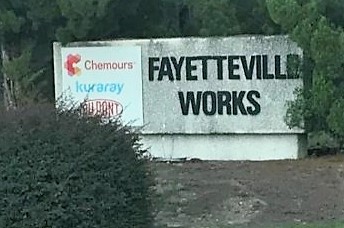Updated March 30 to include comments from the Southern Environmental Law Center and Cape Fear River Watch.

State environmental regulators are asking for feedback on a draft permit to treat PFAS-contaminated groundwater, surface water and stormwater from Chemours Co.’s Fayetteville Works site in Bladen County before it is discharged into the Cape Fear River, the drinking water source for the Wilmington area.
Supporter Spotlight
The North Carolina Department of Environmental Quality Division of Water Resources will accept comments until May 2 by email to publiccomments@ncdenr.gov with CHEMOURS in the subject line or mailed to Wastewater Permitting, Attn: Chemours Permit, 1617 Mail Service Center, Raleigh, N.C. 27699-1617.
The National Pollutant Discharge Elimination System, or NPDES, wastewater permit is part of the required actions to prevent residual per- and polyfluoroalkyl substances, or PFAS, pollution from entering the Cape Fear River from the Chemours site, as outlined in the 2020 Addendum to the 2019 Consent Order.
The 2019 consent order between the Department of Environmental Quality, Cape Fear River Watch, represented by the Southern Environmental Law Center, and Chemours requiring the company to address PFAS sources and contamination at the facility to prevent further impacts to air, soil, groundwater and surface waters. The state ordered in the 2020 addendum additional actions by Chemours including addressing more than 90% of the PFAS entering the Cape Fear River through groundwater from the residual contamination on the site. Chemours was required in the addendum to address four identified seeps that account for more than half of the PFAS contamination in the groundwater entering the river.
As of 2022, the interim measures required by the addendum are operational, and the design of the barrier wall and treatment system is underway, according to the state.
Chemours submitted draft plans earlier in March to the state for approval of a permanent measure to install a more than 1-mile-long, subsurface barrier wall and groundwater extraction system to capture contaminated groundwater to prevent it from entering the Cape Fear River.
Supporter Spotlight
The draft NPDES permit requires treatment to remove PFAS contamination from the groundwater, surface water and stormwater captured by the extraction system before discharge into the Cape Fear River. The system must remove at least 99% of PFAS and meet daily and monthly effluent limits as specified in the permit conditions.
The draft NPDES permit only allows the discharge of treated water associated with the remediation activities. It does not allow the discharge of wastewater from plant operations or processes. The proposed permit does not change the conditions of any previous NPDES permit held by Chemours.
Lisa Randall, regional communications lead with Chemours, provided the following statement in response to Coastal Review’s request for comment.
“Construction of the barrier wall and related water treatment system, for which this permit is intended, is an important part of reducing site-related legacy PFAS that reach the Cape Fear. The groundwater treatment system will use granulated activated carbon to achieve a 99% removal of PFAS compounds. We welcome the opportunity for the public to comment given the importance of the permit in being able to achieve the desired reductions. Timely issuance of the permit is essential to meet consent order timeframes.”
Geoff Gisler, senior attorney at the Southern Environmental Law Center, which took Chemours and DEQ to court on behalf of Cape Fear River Watch to stop PFAS pollution, said in a statement that the department’s draft permit unnecessarily allows Chemours to dump high levels of PFAS into the Cape Fear River.
“Technology installed as required by the consent order has nearly eliminated Chemours’ PFAS pollution from some parts of its site — DEQ must use that information to protect communities from PFAS contamination in Chemours’ proposed discharge. DEQ’s draft permit doesn’t provide that protection,” he said.
“After all we have learned over the past five years, it is shocking that DEQ would draft a permit allowing Chemours to release any PFAS into the Cape Fear River, let alone at the levels allowable under this draft permit,” Dana Sargent, executive director of Cape Fear River Watch, said in a statement. “We need DEQ to do its job and protect us from Chemours’ historic and consistent disregard for human health and the environment.”
The Department of Environmental Quality has made draft permit and further information available online.







